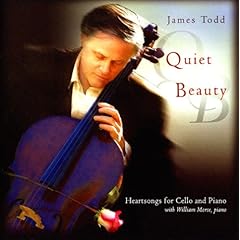Quiet Beauty: Heartsongs for Cello and Piano
 There are numerous styles of classical music. Often when we think of modern classical music, we think of music that is difficult to listen to, even more difficult to play and some times even difficult to put back in the CD player to get through a second time. But there are artists who still love the art of melody, the art of simple beauty, music that wafts through the room with a sense of gentleness, a quiet beauty. Certainly Ralph Vaughn Williams was one of these composers. While his music is considered neo-romantic in style, his The Lark Ascending (1914) is one of the most beautiful pieces for violin ever composed. It is extremely lyrical, describing the beauty of the English country side through music. Much of this piece sounds as if the musicians are simply playing what's inside their hearts rather than reading it off a page.
There are numerous styles of classical music. Often when we think of modern classical music, we think of music that is difficult to listen to, even more difficult to play and some times even difficult to put back in the CD player to get through a second time. But there are artists who still love the art of melody, the art of simple beauty, music that wafts through the room with a sense of gentleness, a quiet beauty. Certainly Ralph Vaughn Williams was one of these composers. While his music is considered neo-romantic in style, his The Lark Ascending (1914) is one of the most beautiful pieces for violin ever composed. It is extremely lyrical, describing the beauty of the English country side through music. Much of this piece sounds as if the musicians are simply playing what's inside their hearts rather than reading it off a page.
There are modern composers who achieve some of the same sweet essence in their music. Windham Hill records is perhaps a shining example of this sort of music, creating a host of CD's filled with lyrical melodies. However, I came across an artist the other day, Colorado cellist James Todd and his CD Quiet Beauty, who strives for this same sense of heartfelt beauty in his music. The quote in his liner notes from Victor Hugo describes the feeling of his CD perfectly, "Music expresses that which cannot be put into words, yet cannot remain silent."
From the first track, "New Day" you get a sense this CD was created by musicians who thoroughly enjoy playing together. James Todd is joined by pianist William Morse to great a lush album of cello and piano tracks which convey a sense of ease with the music they play. Speaking with James about how the music was composed, much of it was written on basically lead sheets allowing the musicians freedom to flow with the moment. Obviously they enjoy the music. It comes through the soaring lyricism as they alternate taking the melody. The problem with this sort of composition is because it is performance based and hard to ever duplicate. The CD Quiet Beauty is not only a showcase of Mr Todd's music, but also of the performance, because without these musicians the music simply would not be the same.
This is an easy album to listen to. The music is verdant, soft and tender. The melodies are lovely and sensitive. However, after track 3, I began to wonder if Mr Todd's life holds any conflict at all. As beautiful as these melodies are, they never seem to stray into anything darker than the shade of tree on a summer's day. The harmonies never get too far from where they started, firmly rooted not only in tonal music, but lacking the edge or harmonic uncertainty of Brahms, Schubert or Liszt. Great romantic composers understood the need for tension in music, building to a great sense of release when it resolves. As lovely as each track of Quiet Beauty is, there is little difference from style and sentiment from one to the next. Without the contrast of the darker aspects of music (more exotic leaden harmonies to create tension and desperation) the soaring segments never seem to quite achieve their full potential.
The CD would have benefited from more pathos in the album overall. Still, Quiet Beauty is an attractive album, one James Todd should be proud of. I believe the CD achieves what he set out to do, to show how well the cello can croon a beautiful ballad. Each track is an example of the composer's sense of song, a collection of lovely, melodic pieces.

Comments